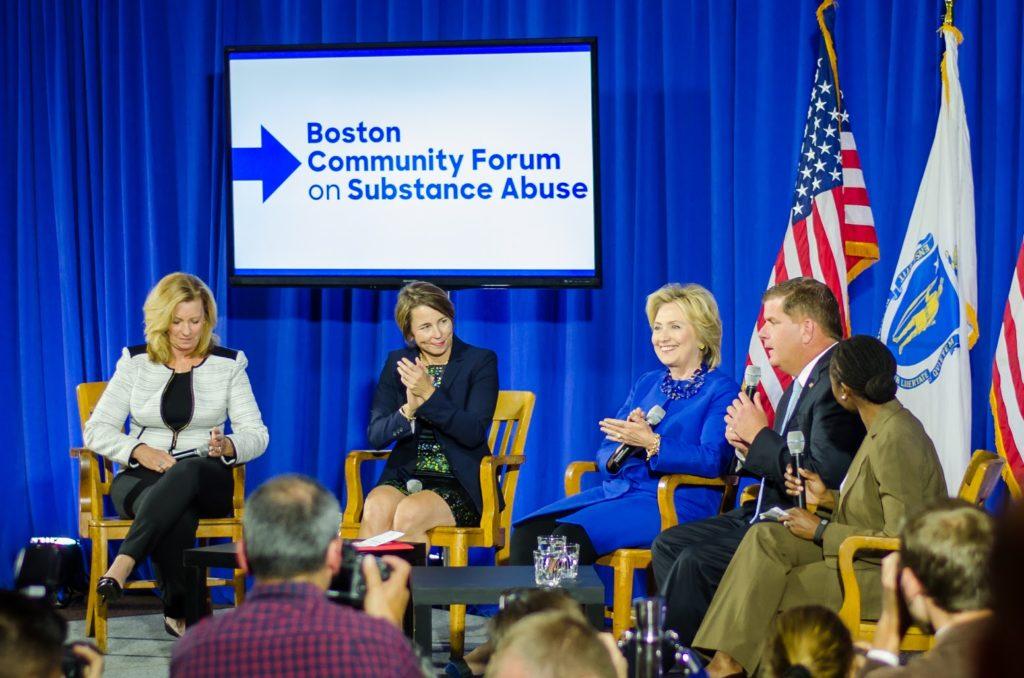By Mack Hogan, news correspondent
Hillary Clinton vowed to take a large role in combatting the nation’s drug epidemic at a community forum in a Teacher’s Union building in Dorchester on Oct. 1.
“I became focused on this issue for the same reason many of you did – because I know someone who struggled, and ultimately failed, at recovering from addiction,” Clinton said.
Mayor Martin J. Walsh and Massachusetts Attorney General Maura Healey appeared alongside Clinton. The two Massachusetts Democrats praised Clinton’s commitment to addressing urban drug problems.
“She was the first candidate to talk about [drug abuse] seriously,” Walsh said.
More than 1000 people died of opioid overdoses in Massachusetts last year, according to the Massachusetts Department of Public Health. The number of deaths caused by opioid overdoses jumped by more than 300 between 2012 and 2014.
While Healey has already declared support for Clinton in the upcoming election, Walsh has yet to endorse any of the candidates. The democratic mayor, a recovering alcoholic, spoke of his efforts to reduce drug abuse in Boston and argued that this issue must be dealt with from all sides.
“We have to fight this issue on a federal level, a state level, a community level and a neighborhood level,” Walsh said.
Healey spoke of her efforts to increase the availability of Narcan, a drug she called “the antidote to opioids.” Massachusetts, under her direction, recently eased restrictions regarding Narcan, enabling wider access to the drug.
Opiate prescriptions, Healey said, are a large contributor to drug issues in the United States.
“Here in the US, we have only 5 percent of the world’s population, but we consume 80 percent of the world’s opiates,” Healey said. “There is no one running for president of the United States that knows more or has a better policy on this issue [than Clinton]. We need a partner on the federal level.”
Clinton, who was a proponent of the minimum sentencing laws passed during her husband’s tenure, said she is now focused on rehabilitation instead of punishment for drug offenders. When pressed by an audience member about her record, Clinton acknowledged her position on the issue of drug sentencing had changed.
“I’ve already changed my ideas just today from hearing your stories,” she said in reply to the attendee who criticized her previous position on incarceration. “I don’t pretend to have all of the answers, and I think we all need to work together.”
Clinton came out against the incarceration of minor drug offenders, saying policy makers must treat drug use more as a health problem than a criminal one.
A major improvement she would seek is providing cheap and easy access to health care for addicts, she said.
“If you have heart disease, if you have cancer, you can find treatment. I think those with substance abuse problems should be able to do the same and not worry about prison or bankruptcy,” Clinton said, drawing big cheers from the crowd.
Interspersed among the personal and emotional stories about the effects of addiction, Clinton also talked specifics regarding her plan to combat the drug epidemic in the country. She noted a need for judicial reform and more support from the federal government.
“I want to use $10 billion over 10 years. $7.5 billion of that will go to cities and states like [Boston and Massachusetts] with good programs, with a funding system based on who is getting results,” she said.
The event was relatively small, with fewer than 200 people attending, and the medium-sized room was only partially full. Audience reaction, though, was exceedingly positive.
“Mar, you’re in the ring with us. And if you’re with Hillary, then I’m in the ring with both of you,” audience member and Boston resident Paul Buribau said of Healey.
“My son was an addict for 10 years, and there was nothing we could do.”
Dressed in his late son’s Army uniform, Buribau said he supported whomever Healey did.
Other audience members echoed Buribau’s sentiment.
“If Secretary Clinton is going to be our ally in the fight against drug abuse, we have to make sure that she’s our next president,” Jack Kelly, a former addict and friend of Walsh, said.
Photo by Robert Smith















